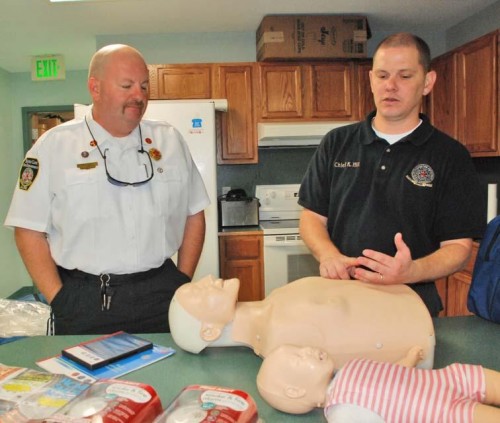
Officials not laughing at Spencer’s gifts
October 5, 2010
Bayou Cane uses grant money for fire safety
October 7, 2010A November runoff between longtime Republican elected official Jay Dardenne and Democratic political newcomer Caroline Fayard will decide who will be Louisiana’s next lieutenant governor.
The two were the top vote-getters Saturday in a field of eight candidates.
Dardenne, secretary of state and a former state senator from Baton Rouge, led the race with 28 percent of the vote, with 91 percent of precincts reporting. Fayard, a New Orleans lawyer, had 23 percent.
Dardenne said the runoff will give voters a choice between candidates with clear philosophical differences.
“Caroline has the support of the entire national Democratic establishment, it appears,” he said, citing Fayard’s backing by former President Bill Clinton, who attended a fundraiser for her. “I don’t represent what that stands for. I represent fiscal conservatism,” Dardenne said.
Fayard disagreed about the distinctions, saying the race wasn’t about partisan politics, and instead suggested the decision was between a fresh face and a politician who has held office for years.
“It disappoints me that people want to make this about partisan politics and I think voters will be disappointed too, and I look forward to discussing that further as we go forward in the race,” she said.
Country singer Sammy Kershaw came in third, with 20 percent of the vote, failing in his second bid for the lieutenant governor’s office.
The Nov. 2 runoff election will decide who’ll finish out the remaining year of Mitch Landrieu’s term after he left to become New Orleans mayor.
The field of Republicans also included St. Tammany Parish President Kevin Davis and state Republican Party Chairman Roger Villere. Democrats included state Sen. Butch Gautreaux of Morgan City and Jim Crowley, a former Caddo Parish police juror who’s run unsuccessfully for several statewide offices. They all garnered support in single digits.
Besides being first in the succession line if something happens to the governor, Louisiana’s lieutenant governor oversees the Department of Culture, Recreation and Tourism and manages parks, museums, the state library and tourism efforts.
With Gov. Bobby Jindal’s prominence on the national political scene and speculation he’ll try to make a move to Washington, political watchers have said the vacancy has taken on added significance.
The two candidates to advance to the runoff were the two highest money-raisers in the race.
Dardenne raised nearly a million dollars since announcing his candidacy. He ran on his years of service and campaigned on a need to “rebrand Louisiana” to attract tourists, retirees and new residents.
Fayard poured at least $440,000 of her own money into the race and raised $350,000 more.
A political upstart who didn’t launch a campaign until July, Fayard capitalized on her politically well-connected family and mounted a large TV campaign with ads running in high-profile times, like during New Orleans Saints games. She pitched herself as the fresh face and complained about career politicians.
Dardenne said he expected Fayard to add more of her own cash to the campaign – but he said he wouldn’t be doing the same.
“I fully expect that she will out-raise me and outspend me. She has unlimited personal wealth and the entire Democratic machine behind her,” he said.
Others, including Gautreaux and Davis, put up their own money as well to help run their campaigns, but still couldn’t garner much support for their campaigns.
Gautreaux had lined up the backing of many of the state’s top-ranking Democratic elected officials and campaigned mainly by hammering oil giant BP for the massive Gulf oil spill and its damage to the state’s tourism efforts.
Villere had hoped the grass-roots tea party movement and his opposition to President Barack Obama could propel him to a runoff, and Kershaw had tried to corner the rural vote and capitalize on his local celebrity status to gain traction.
Other candidates on the ballot – Crowley and Republican Melanie McKnight of Baton Rouge – had done little to no fundraising and only limited campaigning.
Anyone winning this fall’s election will have to run again in the 2011 regular statewide election cycle to keep the lieutenant governor’s seat.
Also decided by voters Saturday were:
• Two proposed amendments to the Louisiana Constitution appeared headed to approval.
The first will move up the start date of annual legislative sessions, beginning in 2012. Sixty-two percent of voters backed the idea, with 3,531 of 3,877 precincts tallied.
The other will make 425 workers in the Governor’s Office of Homeland Security and Emergency Preparedness not subject to civil service rules and protections, addressing an ongoing lawsuit with the Civil Service Commission over the status of the workers. The proposal gained support from 53 percent of voters, with 91 percent of precincts reporting.
• Lambert Boissiere III retained his seat on the Public Service Commission against a challenge by John Schwegmann, a former PSC member. Both are Democrats. The commission regulates companies that provide utilities, telephone and trucking services in Louisiana.
• Special elections were held to fill two vacant state legislative seats, one in the House and the other in the Senate. The outcome in a New Orleans-based Senate post that was opened when Democrat Ann Duplessis took a job in Mitch Landrieu’s administration remained undecided late Saturday. Lawyer Alan Seabaugh, a Republican, won a Caddo Parish-based state House seat that became available when Republican Wayne Waddell resigned to take a job as director of the Louisiana State Exhibit Museum.









